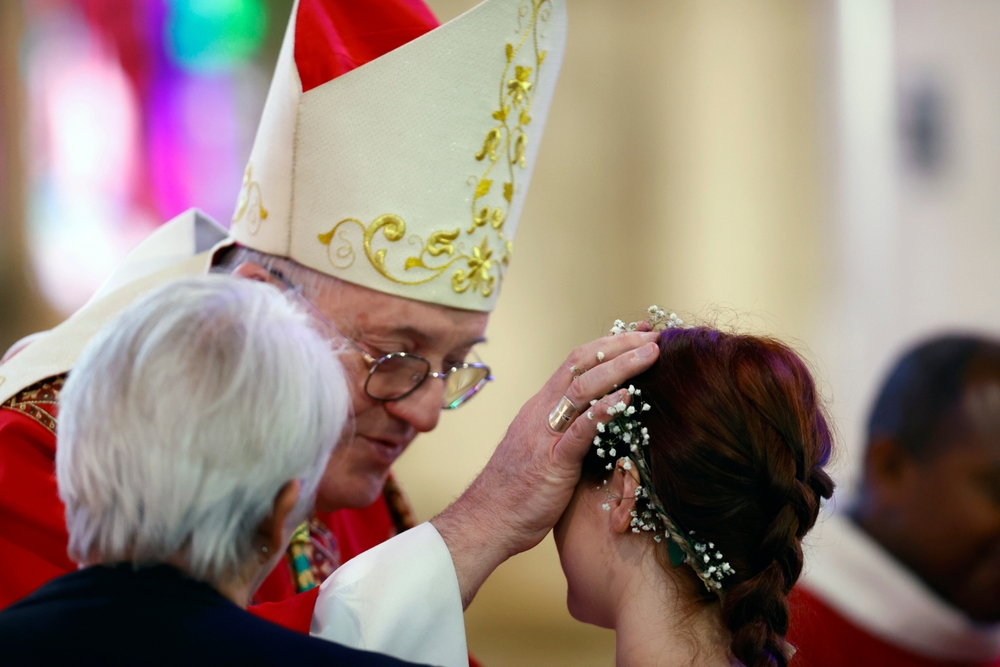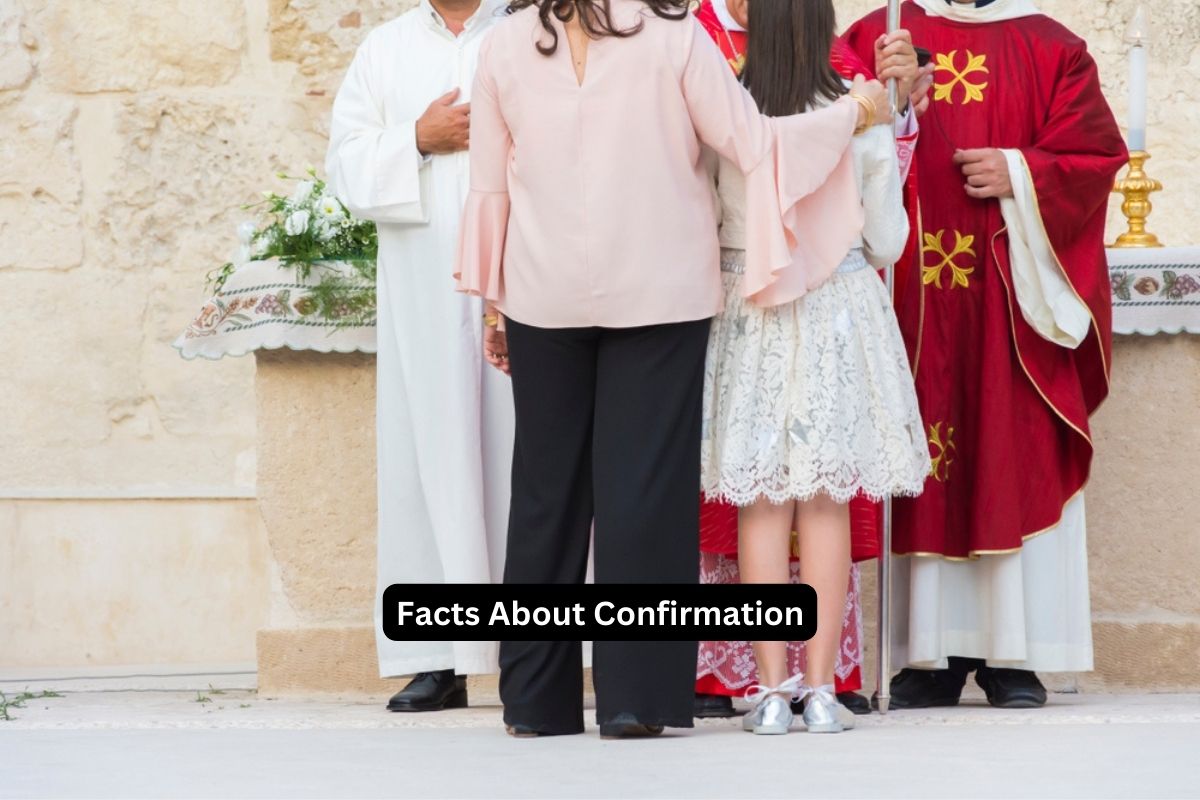Confirmation is a vital sacrament in Christianity, observed in several denominations, including the Catholic Church, Eastern Orthodoxy, Anglicanism, and certain Protestant traditions.
This sacrament, often referred to as the “Sacrament of the Holy Spirit,” signifies the reception of the Holy Spirit and serves as a milestone in an individual’s faith journey.
In this discussion, we’ll explore key aspects of confirmation, its significance, associated practices, and its role in the Christian faith.
Confirmation Facts
1. Confirmation is a Christian sacrament
Confirmation is one of the seven sacraments recognized in many Christian traditions, particularly in the Catholic Church, Eastern Orthodoxy, Anglicanism, and some Protestant denominations. Sacraments are considered sacred rituals or ceremonies that have deep spiritual significance.
2. It is often called the “Sacrament of the Holy Spirit”
Confirmation is often referred to as the “Sacrament of the Holy Spirit” because it is believed to be the sacrament in which individuals receive the fullness of the Holy Spirit.
Also Read: Facts About Communion
In Christian theology, the Holy Spirit is considered the third person of the Holy Trinity (alongside God the Father and Jesus Christ), and confirmation is seen as a means of receiving His presence and guidance in one’s life.

3. It signifies the reception of the Holy Spirit
The central significance of confirmation is the belief that, through this sacrament, the individual being confirmed receives the Holy Spirit. This reception of the Holy Spirit is seen as a strengthening and deepening of one’s faith.
It is often described as an “outpouring” or “anointing” of the Holy Spirit upon the candidate, empowering them to live a more committed and Christian life.
4. The age for receiving confirmation varies by denomination
The age at which individuals receive confirmation can vary significantly depending on the Christian denomination and local customs.
In the Roman Catholic Church, for example, confirmation is typically administered to adolescents, usually between the ages of 12 and 18.
Also Read: Ash Wednesday Facts
However, some dioceses may have different guidelines. In other Christian traditions, such as the Eastern Orthodox Church, confirmation is often administered at the same time as baptism, regardless of age
5. During confirmation, a bishop or priest lays hands on the candidate
During the confirmation ceremony, a bishop or priest plays a central role in administering the sacrament. The candidate kneels or stands before the bishop or priest, who then lays their hands on the candidate’s head.
This physical gesture symbolizes the transmission of the Holy Spirit and the conferral of spiritual grace upon the individual. The laying on of hands is a powerful and ancient practice in Christian traditions, with its roots in the New Testament.

6. It is closely connected to baptism
Confirmation is closely linked to the sacrament of baptism in many Christian traditions. Baptism is often the first sacrament received by individuals, typically in infancy, and it symbolizes initiation into the Christian faith.
Confirmation, on the other hand, is viewed as a subsequent sacrament that allows individuals to affirm and personally ratify the promises made on their behalf during baptism. It is often seen as a step toward greater maturity in one’s faith journey.
In some traditions, such as the Roman Catholic Church, confirmation is considered the second of the three sacraments of initiation, the first being baptism and the third being the Eucharist (Holy Communion). Together, these sacraments mark an individual’s full initiation into the life of the Christian community and their commitment to living out their faith.
The connection between confirmation and baptism highlights the idea that confirmation is a public declaration of one’s faith and a conscious decision to embrace and continue the Christian journey that began with baptism.
The relationship between these two sacraments underscores the importance of faith development and personal commitment in the Christian faith.
7. Some candidates choose a confirmation name
When preparing for confirmation, some candidates choose to take a confirmation name. This is an additional name, typically the name of a saint in the Christian tradition, that they add to their own name.
The practice of selecting a confirmation name is rooted in the desire to emulate and seek the intercession of the chosen saint. It serves as a symbol of the candidate’s commitment to their faith and the Christian values associated with the chosen saint.
8. It is associated with the gifts of the Holy Spirit
Confirmation is often associated with the gifts of the Holy Spirit, which are mentioned in the Bible in passages such as Isaiah 11:2-3 and 1 Corinthians 12:7-11. These gifts include wisdom, understanding, counsel, fortitude, knowledge, piety, and fear of the Lord.
It is believed that through the sacrament of confirmation, individuals receive these gifts to help them live a more faithful and righteous life.
9. Different Christian denominations have varying practices
Confirmation practices can vary significantly among different Christian denominations. For instance:
- In the Roman Catholic Church, confirmation is typically administered by a bishop, and it is one of the seven sacraments. It involves the use of chrism oil and is usually administered during adolescence.
- In the Eastern Orthodox Church, confirmation, also known as chrismation, is administered at the time of baptism, with the anointing using chrism oil.
- In some Protestant denominations, confirmation may be observed but with variations in the theological understanding and practices associated with it. Some may not practice confirmation at all.
10. Preparation is essential before receiving confirmation.
Before receiving the sacrament of confirmation, candidates usually undergo a period of preparation. This preparation can include:
- Religious education: Candidates may receive instruction on the basic tenets of the Christian faith, the significance of confirmation, and the teachings of their specific denomination.
- Reflection and prayer: Candidates are encouraged to reflect on their faith journey, engage in prayer, and develop a personal relationship with God.
- Service and community involvement: Many confirmation programs emphasize the importance of serving others and becoming active members of their church community.
The preparation process is designed to help candidates understand the significance of confirmation, deepen their faith, and make an informed and heartfelt commitment to their Christian faith. It may vary in duration and content based on the specific denomination and local practices.
